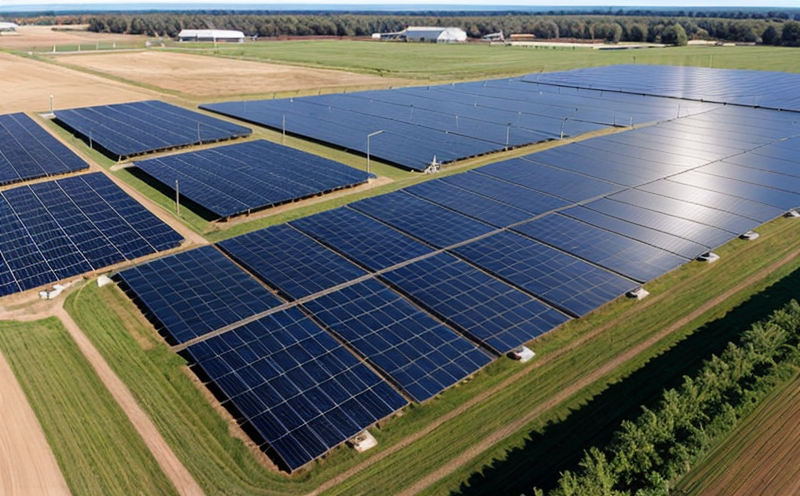UL 1741 Inverter Interconnection Testing in New Applications
The UL 1741 standard is a pivotal component of the North American grid interconnection requirements for inverters used in photovoltaic (PV) systems. This service provides comprehensive testing to ensure that new applications adhere strictly to UL 1741 compliance, which is essential for safe and efficient integration into existing electrical grids.
The UL 1741 standard addresses several critical aspects of inverter design, including power quality, harmonic distortion, fault ride-through capability, and voltage regulation. Compliance with these requirements ensures that inverters can seamlessly integrate with the grid without causing instability or damage to other components. This service focuses on the testing necessary for new applications, which may include novel designs, advanced technologies, or modifications to existing standards.
Our team of experts performs a series of rigorous tests to ensure compliance with UL 1741, including:
- Power Quality Testing: Verification that the inverter's output is within acceptable limits for grid stability and performance.
- Harmful Harmonics Testing: Ensuring that the inverter does not introduce excessive harmonic distortion into the electrical system.
- Fault Ride-Through Capability: Assessing the ability of the inverter to continue operating during power interruptions or faults on the grid.
- Voltage Regulation and Stability: Confirming that the inverter can maintain stable voltage levels under various conditions, including fluctuations and load changes.
The testing process involves meticulous preparation of specimens. Specimens are typically new inverters or prototypes that have been designed to meet emerging technologies and applications. The apparatus used includes advanced measurement tools such as power analyzers, harmonic distortion meters, and voltage stability monitors. Once prepared, the specimens undergo a series of tests that simulate real-world conditions and operational scenarios.
Upon completion of testing, our team provides detailed reports that outline all test results and compliance status. These reports are crucial for stakeholders involved in product development and quality assurance to ensure that new applications meet or exceed regulatory requirements. For those seeking to innovate within the renewable energy sector, this service ensures that any modifications or new designs comply with UL 1741 standards.
Our comprehensive testing services not only guarantee compliance but also provide insights into potential improvements for future iterations of inverter technology. This is particularly valuable as the renewable energy landscape evolves rapidly, with increasing demands on inverters to support grid reliability and sustainability goals.
Benefits
Compliance with UL 1741 standards offers numerous advantages for manufacturers of inverter technology. By ensuring that new applications adhere strictly to these regulations, companies can:
- Avoid Legal and Regulatory Risks: Non-compliance can lead to penalties, recalls, and reputational damage.
- Enhance Product Reliability: Rigorous testing helps identify potential issues early in the development process, leading to more reliable products.
- Increase Market Access: Compliance with UL 1741 opens doors to a broader market, including utility companies and other stakeholders.
- Support Innovation: The service not only ensures compliance but also provides feedback that can drive continuous improvement in inverter technology.
In addition, this service supports the broader goal of sustainable energy production by ensuring that new applications contribute to a stable and efficient grid. This is particularly important as the world transitions towards greater reliance on renewable energy sources.
Customer Impact and Satisfaction
The impact of UL 1741 compliance extends beyond mere regulatory adherence; it significantly enhances customer satisfaction by ensuring the safety, reliability, and efficiency of renewable energy systems. Here are some key ways in which this service impacts customers:
- Safety Assurance: By adhering to strict testing protocols, we ensure that new applications do not pose risks to end-users or the grid.
- Enhanced Reliability: Customers benefit from more reliable and stable systems, which can lead to reduced maintenance costs and increased system uptime.
- Market Confidence: Compliance with UL 1741 standards enhances market confidence in new applications, leading to greater adoption and wider acceptance.
- Environmental Impact: By supporting the integration of renewable energy sources into existing grids, we contribute to a more sustainable future.
Clients who invest in this service can expect a high level of satisfaction, knowing that their products are not only compliant but also perform exceptionally well under real-world conditions. This ensures long-term success and trust within the industry.
Competitive Advantage and Market Impact
The UL 1741 Inverter Interconnection Testing in New Applications service provides a significant competitive advantage by ensuring that new applications meet or exceed the highest standards of safety, reliability, and performance. This is particularly important as the renewable energy sector continues to grow and evolve.
By offering this specialized testing service, we help our clients:
- Differentiate in a Crowded Market: Compliance with UL 1741 standards sets new applications apart from competitors who may not meet these stringent requirements.
- Attract and Retain Customers: Reliable products that comply with regulatory standards are more likely to attract and retain customers, leading to increased market share.
- Promote Innovation: The service provides valuable insights into potential improvements for future iterations of inverter technology, fostering innovation within the industry.
- Stay Ahead of Regulatory Changes: As regulatory requirements evolve, our clients can stay ahead by ensuring that their products meet or exceed these new standards.
The market impact of this service is substantial. By supporting the integration of renewable energy sources into existing grids, we contribute to a more sustainable future and help drive the transition towards cleaner energy production. This not only benefits our clients but also contributes positively to global efforts to combat climate change.





